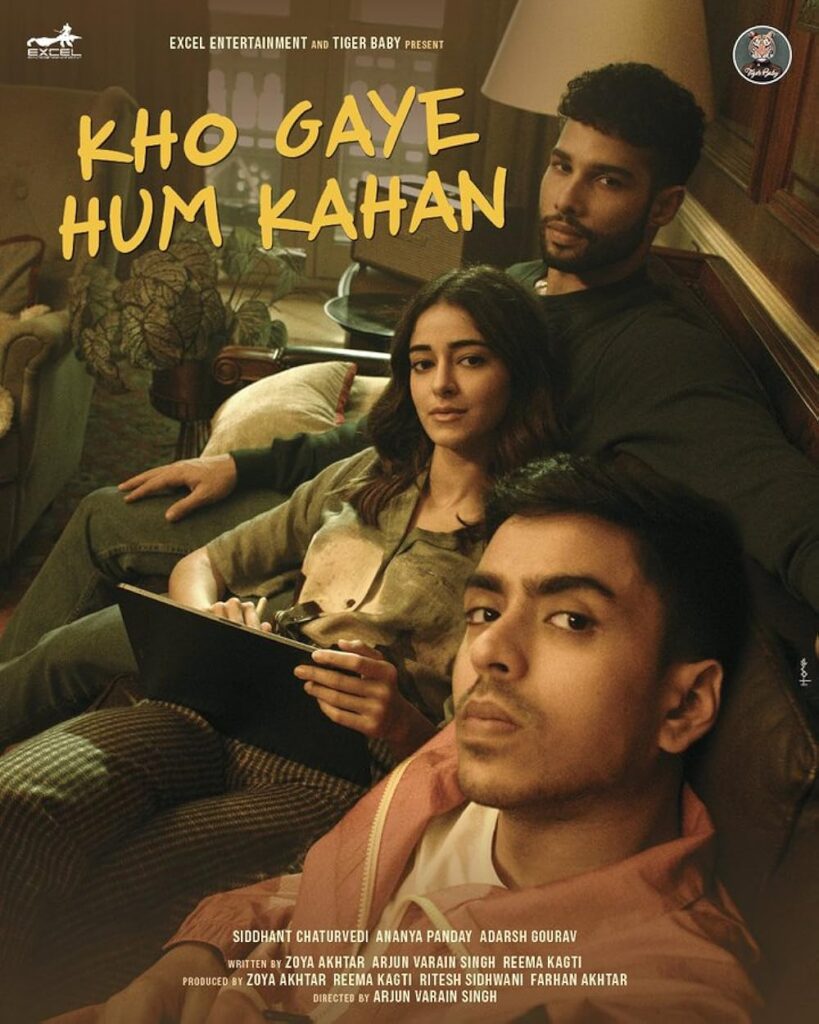Kho Gaye Hum Kahan
Introduction
We had a midweek release yesterday, and my FOMO just got to me! With that, I finished watching the new Hindi film Kho Gaye Hum Kahan which is streaming on Netflix. Friendship has often been a core ingredient as far as films are concerned. One of the earliest songs that I remember, something that my grandfather used to hum was “Yeh Dosti…Hum Nahi Todenge” from the film Sholey. And quite honestly, the first real film on ‘Friendship’ that I witnessed onscreen had to be Dil Chahta Hai, which made adulthood look cool, and those were the days that I really wished to get past my childhood to witness ‘that'(lol, that didn’t age well, did it?). In my Engineering days came along a film titled Zindagi Na Milegi Dobara that added another leaf to my imaginary bible of taking a ‘Euro Trip’ with my friends(slow claps, Goa bhi nahi hua hai). But my point here being that each generation is witness to a ‘Friendship’ film that does play around with the dynamics of the characters with respect to the setting(much like the Marketing Campaign of Kho Gaye Hum Kahan).
Right from the onset of technology, the growing distance between individuals has been quite alarming. With apps on your phone for dating and several social media platforms to interact, the joy of physically meeting a person has started to fade over time. In this very space, the searing question lies, ‘Where Does Friendship Stand In The Midst Of It’. The advent of technology has already had its repercussions on our entire generation, all of whom are grappling with our own issues while trying to portray a self of ours that isn’t the real version at all. We do believe in comparisons and the idea of ‘the grass being greener on the other side’, and as a result we have probably grown to be the loneliest beings to have ever lived. Yet, each day we present the world with a smile in hope that things will get better. And based on this reality, I was quite looking forward to watching Kho Gaye Hum Kahan, does it manage to impress…let’s find out.
Story & Screenplay
Kho Gaye Hum Kahan is a slice of life drama following the lives of three buddies amidst the digital era of loneliness. The story here is fresh and presents a searing commentary on the outlook of an entire generation overtly exposed to the use of technology. And it touches upon so many aspects of insecurity, vulnerability and loneliness that often work as by-products of the digital era along with topics of impersonation and online trolls. The screenplay standing at about 135 minutes is light and breezy but also edgy in its third act that makes for an intimate and accurate representation of the Gen Z and the relationships that we(Gen Y included) share.
The drama opens with the introduction of the three protagonists, each from different walks of life and hierarchies of the society, yet tied with a single thread of technology. There is a sense of aimless while also wishing to enjoy life to the fullest. Along the way, each of them have fleeting relationships, some serious, some fake and some casual while putting up a pretence that all is well without addressing the elephant in the room. But to begin with, the bond that they share with each other is infectious and quite unshakable. The question though is, for how long? The writers Zoya Akhtar, Reema Kagti and Arjun Varain Singh present a very relatable world that is as close to reality as possible, atleast in its urban setting. The focus remains of the character dynamics that often shepherds the screenplay ahead. And along the way, there is an underlying commentary of the ‘Wannabe’ generation that we all comprise of, that acts like a harsh reality check.
We are probably the first generation to find ourselves in our phone with our heads immersed, more often than not. As a result, our mindset is fickle with an extremely low attention span. The same aspect reflects in our relationships too, something that the writers tap into perfectly. The proceedings are engrossing and engaging with you as a viewer are consumed by the lives of the protagonists as they navigate through life in a very different manner from what our parents would have. The same is reflective in the contrasting ideologies between a character and his parents wherein he does ridicule them for not upgrading their lives. This, while he himself falls for an influencer whom he would later call as ‘A Chalti Phirti Dukaan’. Elsewhere, the baggage of a relationship does weigh a character down, to an extent that she starts posting stuff outside her character trait, just to get some attention(particularly of her ex who has deserted her for someone else). And lastly, a character undergoing therapy is ironically a standup comic, in what is a juxtaposition of his mindset of what he wishes to be versus what his reality is. And so he resorts to a dating app to keep himself invested and subconsciously in search for love, while burying his deepest secrets deep within himself.
The conflict introduced here is gentle but also an accurate depiction of how fast friendships can shatter, on the smallest of issues in the digital world. But what the writers do is also add a layer of maturity to the characters as the drama tactfully progresses. So the realisation of their mistakes occurs mostly from their own personal experiences(through the edgy third act), something that holds a lot of relevance in today’s relationships. And yet, the characters represent our generation who are willing to be bygones as bygones and move ahead in life, often with a smile on their faces with a lingering pain in their hearts. And that is what sums up this breezy screenplay that could have skipped the ‘gyaan’ at the very end while allowing things to be interpreted as per the intellect of the viewers. Nevertheless, the writing is exceptional and quite accurate in its representation.
Dialogues, Music & Direction
The dialogues are very Gen Z and they accurately represent the lingo of our generation. The lines are playful but also seamlessly profound at various junctures in the screenplay. The music is vibrant and refreshing while perfectly being in sync with the unfolding drama. The BGM is subdued while mostly allowing the edgy drama to take precedence. The cinematography is edgy and representative of the broken lives of our generation. Certain metaphors are thrown along the way as a part of the production design. For instance, the character of Siddhant performs a standup in a club called ‘Hideout’ which is representative of his mental state with respect to his past. The editing is quite crisp and doesn’t allow lags to creep into the narrative. The costume department deserves a shoutout for representing the character traits of various characters through the costumes. Director Arjun Varain Singh understands the pulse of the generation perfectly and it just reflects beautifully in his writing and direction. He does keep the tone of the drama light and frothy while playing out the searing commentary as an undercurrent. As a result, the drama never gets too heavy for consumption, and a lot of the credit goes to the director for the same.
Performances
The performances are excellent by the ensemble cast. Sonali Sachdeva and Ikhlaque Khan as Ahana’s parents have their moments to shine. Suchitra Pillai as the psychiatrist pulls off her character with a certain amount of dignity. Vijay Maurya and Divya Jagdale as Neil’s parents are excellent to witness and the war of ideologies is gently represented through their characters. Rahul Vora as Imaad’s factor and Kashyap Kapoor as Melbun have their moments to shine. Garima Yajnik as Meher has an affable presence onscreen in a job well done. Rohan Gurbaxani as Rohan is representative of the confused mindset of our generation who wishes for both options without having to choose one, and he did a pretty good job in conveying it through his character. Anya Singh as Lala again represents a character who ‘pretends’ to live a different life on socia media, and she pulls off her character with aplomb! Kalki Koechlin as Simran is more matured in her outlook given the age of her character, and there is a certain sense of affection and sincerity that runs through her character. She was such a treat to witness.
Adarsh Gourav as Neil is such a fine actor and he puts his best foot forward here as an individual who is swayed by the ‘influencers’ around him and on his social media. He is brilliant to the core in his confrontational scenes while internalising his performance to perfection.
Siddhant Chaturvedi as Imaad brings forth a sense of unsaid emotions to the table beautifully well. Going through a mountain of pain within, while ‘acting’ as a stand up comic(with hilarious gags by the way) required him to showcase his vulnerability, and he did so rather brilliant.
Ananya Panday as Ahana is such a revelation in perhaps the best act of her budding career so far. She is such a natural onscreen representing a far superior and matured self from the ‘Liger’ version of herself. Her emotions and expressions were on point in a wonderful performance representing the baggage of a relationship that her character carries. More power to you girl, more power!
Conclusion
Kho Gaye Hum Kahan is an intimate and accurate account of the metamorphosis of relationships in the digital era of loneliness. As the lines go, ‘Ya Toh Yeh Dosti Gehri Hai Ya Yeh Photo 3D Hai, With Filters Ofcourse’. Available on Netflix and Highly Recommended.




